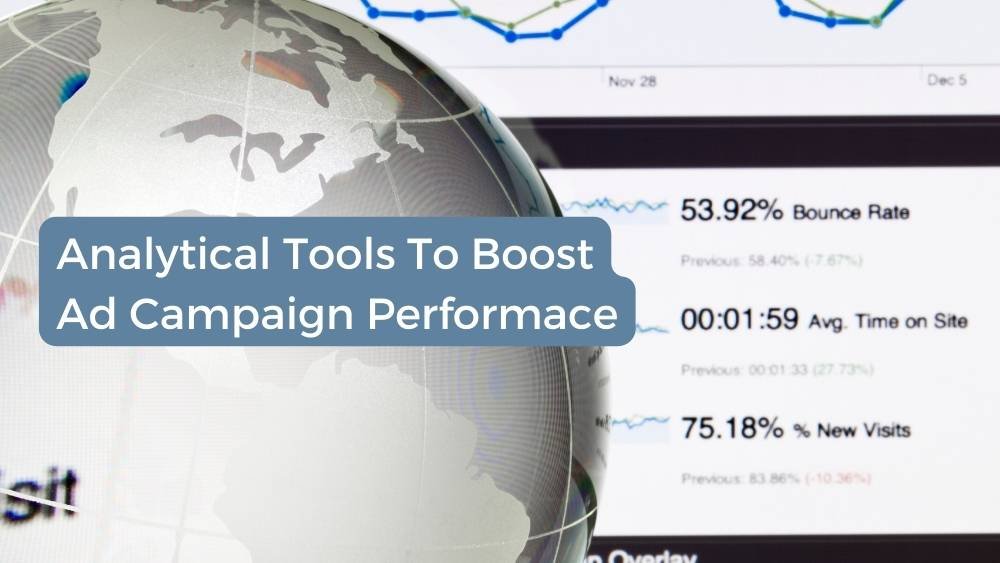Why should you use analytical tools for measuring ad campaign success?
Using the right analytical tools for ad campaigns will help you to track the performance of your marketing campaign in real-time, which will help you to optimize the ad campaigns at a fast pace, with detailed data reports that will help you refine your campaigns & formulate future marketing campaigns.
Analytical tools for ad campaigns play a pivotal role in dissecting the performance of your ads, providing valuable insights that can help optimize your strategy.
In this blog, we will explore 5 analytical tools for ad campaigns that not only measure ad performance but also offer additional benefits to enhance your advertising campaigns. Achieve your goals in 2024!
1. Google Analytics

Source: https://marketingplatform.google.com/about/analytics/
Google Analytics is a well-known and widely used web analytics tool that offers a plethora of features to track and analyze website performance.
While it’s not specifically an ad analytics tool, its capabilities are indispensable for advertisers. Here’s how it goes beyond basic ad tracking:
Conversion Tracking: Google Analytics allows you to set up conversion tracking for various actions, such as form submissions, product purchases, or app downloads. This provides insights into how well your ads are performing in terms of conversions.
Audience Insights: You can gain a deep understanding of your website’s audience, including demographics, interests, and geographic location. This data is invaluable for refining your ad targeting.
Behavior Flow: This feature visualizes the path users take through your site, helping you identify where they drop off. By improving these pages, you can increase the effectiveness of your landing pages linked in ads.
Integration with Google Ads: Seamlessly connect Google Analytics with Google Ads to evaluate ad campaign performance, track ROI, and make data-driven decisions.
2. Facebook Ads Manager

Source: https://business.facebook.com
For those heavily invested in Facebook advertising, the Facebook Ads Manager platform offers comprehensive analytics that goes beyond basic ad performance metrics. Here are some of the extra benefits it provides:
Audience Insights: Facebook’s Audience Insights tool helps you understand the demographics, interests, and behaviors of your target audience. This information is crucial for refining ad targeting and creating content that resonates with your audience.
A/B Testing: You can easily run A/B tests on ad creatives, ad copy, and audience segments within Facebook Ads Manager. This allows you to identify what works best for your specific audience.
Ad Creative Preview: Before launching an ad, you can preview how it will look on various devices and placements, ensuring that your ad maintains its visual appeal across different platforms.
Custom Reporting: Facebook Ads Manager lets you create customized reports, which can be automatically sent to your inbox. This feature streamlines the reporting process and helps you keep a close eye on campaign performance.
3. Google Data Studio


Source: https://lookerstudio.google.com/u/0/
Google Data Studio is a powerful data visualization and reporting tool that can transform raw ad data into insightful, easy-to-understand reports. It’s especially useful for ad agencies and businesses that need to present campaign performance to clients or internal stakeholders. Here’s what makes it valuable:
Data Integration: Google Data Studio allows you to connect multiple data sources, including Google Analytics, Google Ads, Facebook Ads, and more. This consolidation of data simplifies the process of creating holistic ad campaign reports.
Customizable Dashboards: You can create customized dashboards tailored to your specific needs, giving you a clear and real-time view of your ad campaign’s performance.
Interactive Reports: Data Studio reports are interactive, enabling viewers to interact with data visualizations, which can be a great aid during presentations.
Data Sharing: You can easily share your reports with team members, clients, or stakeholders by granting view or edit access to specific individuals. This fosters collaboration and transparency.
4. Hotjar

Source: https://www.hotjar.com/
Hotjar is a user behavior and feedback analytics tool that can provide profound insights into how users interact with your website or landing pages. While not a traditional ad analytics tool, it plays a crucial role in optimizing ad campaigns:
Heatmaps: Hotjar creates heatmaps that visually represent where users click, move their cursors, or scroll. This information helps you understand how users engage with your landing pages, allowing you to optimize ad placements and content.
Session Recordings: You can watch recordings of user sessions to see how they navigate your site. This reveals pain points and bottlenecks in the user journey, helping you fine-tune your landing pages for better conversion rates.
Feedback Surveys: Hotjar enables you to collect direct feedback from users, giving you valuable information on their preferences and pain points.
Conversion Funnels: Track the steps users take before converting (e.g., making a purchase or signing up) and identify where they drop off. This data can be used to optimize your ad landing pages and forms.
5. SEMrush

Source: https://www.semrush.com/
SEMrush is a comprehensive SEO and SEM tool that offers in-depth analytics for both organic and paid searches. While its primary focus is on SEO, it provides valuable insights for your ad campaigns:
Competitor Analysis: SEMrush allows you to compare your ad campaigns against those of your competitors. You can see which keywords they are targeting and get ideas to improve your own ad strategy.
Keyword Research: Identify high-performing keywords related to your products or services. These keywords can be used for ad campaigns to reach a broader and more targeted audience.
Ad Copies Analysis: SEMrush provides insights into the ad copies your competitors are using, giving you a competitive advantage in crafting more compelling ad content.
Position Tracking: Monitor the positions of your ads in search engine results pages (SERPs) for specific keywords. This information helps you assess the effectiveness of your ad placements.
In conclusion, using these 5 analytical tools for ad campaigns will provide valuable insights into audience behavior, landing page optimization, and competitive analysis. Leveraging them in 2024 can lead to more effective ad campaigns, higher conversion rates, and a better return on investment!
If you want to optimize your ad campaigns & need an agency that can provide expertise in this, Socinova is your answer. Get in touch today!
This blog is written by Saili Sabnis from the Socinova Team. Images have copyrights of the respective owners.








